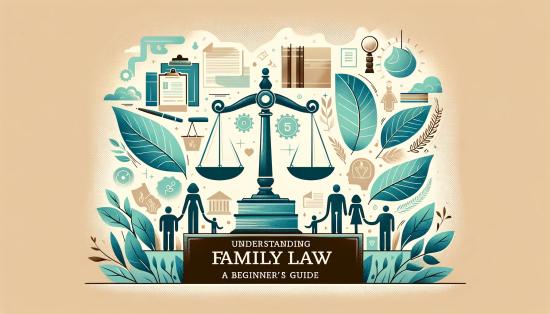
Understanding Family Law: A Beginner's Guide
Explore family law, its evolution, and various legal aspects like marriage, divorce, child custody, adoption, and domestic violence.
Family law encompasses a wide range of legal issues that affect families and individuals, covering areas such as marriage, domestic partnerships, divorce, child custody, and domestic violence. It is an important area of law as it provides the legal framework for resolving family disputes, protecting vulnerable members of the family, and ensuring the welfare of children. Understanding family law is crucial for individuals going through major life events such as divorce, adoption, or domestic violence situations. By being familiar with the legal principles and procedures involved, individuals can make informed decisions and protect their rights and interests. Family law also plays a significant role in shaping society's understanding of family dynamics and relationships, as well as promoting the well-being of all family members.
Family law has a rich and complex history that has evolved over centuries. The origins of family law can be traced back to ancient civilizations such as the Babylonians, who established the earliest known legal code addressing family matters. Throughout history, family law has been shaped by religious, cultural, and political influences, with significant changes occurring during the medieval period and the Renaissance. The Industrial Revolution and the rise of the women's rights movement in the 19th and 20th centuries also had a profound impact on family law, leading to reforms in marriage, divorce, and child custody laws. Today, family law continues to adapt to the ever-changing social and cultural landscape, addressing issues such as same-sex marriage, reproductive rights, and domestic violence.
Marriage and domestic partnerships are important legal frameworks that regulate the relationships of couples and families. Understanding the legal aspects of marriage and domestic partnerships is crucial for individuals who are considering entering into these types of relationships. Marriage is a legally binding contract between two individuals, and it comes with certain legal rights and obligations. Similarly, domestic partnerships, which are recognized in some jurisdictions, also carry legal implications. These legal frameworks govern various aspects such as property rights, financial responsibilities, and the dissolution of the relationship. By understanding the legal framework surrounding marriage and domestic partnerships, individuals can make informed decisions and protect their rights and interests.
Divorce and legal separation can be complex and emotionally challenging processes. The process of divorce involves a legal dissolution of marriage, while legal separation allows spouses to live apart without formally ending the marriage. Grounds for divorce vary by jurisdiction and can include factors such as adultery, abandonment, and irreconcilable differences. Legal implications of divorce and separation can include division of assets, spousal support, and child custody arrangements. It's important to carefully consider the implications of divorce or legal separation and seek legal advice to understand your rights and responsibilities.
When it comes to child custody and support, the courts take into consideration a variety of factors to determine what is in the best interest of the child. These factors can include the child's relationship with each parent, the ability of each parent to provide for the child's physical and emotional needs, and any history of abuse or neglect. Custody decisions can be made through mediation, negotiation, or in court, and the ultimate goal is to create a parenting plan that ensures the child's well-being. Additionally, child support is typically calculated based on the income of both parents, the needs of the child, and the standard of living the child would have enjoyed if the parents were together. It's important to understand the principles behind custody decisions and the calculations for child support to ensure that the child's best interests are prioritized.
Adoption and guardianship are significant legal processes that involve the care and responsibility of a child. When it comes to adoption, the legal procedures and requirements vary depending on the country and state, but they generally involve home studies, background checks, and legal documentation. Prospective parents must meet certain criteria, such as age requirements, financial stability, and suitability for parenting. Additionally, the process can involve the termination of the birth parents' rights and the finalization of the adoption through court approval. On the other hand, becoming a guardian typically occurs in situations where a child's parents are unable to care for them, whether due to illness, incarceration, or other circumstances. Guardianship involves a legal process similar to adoption, including background checks and court approval, to ensure that the child is placed in a safe and stable environment. The legal procedures and requirements for both adoption and guardianship are designed to prioritize the well-being and best interests of the child, making it essential for individuals to seek legal guidance and support throughout these processes.
Establishing paternity is crucial not only for the child's well-being but also for the legal rights and responsibilities of both the father and the child. Paternity can be established through a voluntary acknowledgment by the father, genetic testing, or through a court order. Once paternity is established, the child has the right to financial support, inheritance, and access to the father's medical history. Additionally, the father gains the legal right to visitation or custody, as well as the obligation to provide financial support. Understanding the legal consequences of establishing paternity is essential for both parents to ensure that the child's best interests are met and to navigate the legal system effectively.
Domestic violence is a significant issue within the realm of family law, and protection orders are a crucial tool in providing safety and legal recourse for victims. Family law addresses domestic violence by allowing victims to seek protection through restraining orders, which prohibit the abuser from making contact or being in close proximity to the victim. These orders can also extend to other family members, such as children, in cases of domestic violence. Family law attorneys play a vital role in helping victims navigate the legal process of obtaining protection orders, ensuring that their rights are protected and that they have the support they need during such difficult times. By providing legal avenues for protection, family law contributes to safeguarding individuals and families from the harmful effects of domestic violence.
When faced with legal issues related to family matters, it's important to understand the role of a family law attorney and when it's appropriate to seek their expertise. Family law attorneys specialize in navigating the complexities of legal scenarios such as divorce, child custody, adoption, and domestic violence, among others. If you are considering or going through a divorce, seeking legal advice from a family law attorney can provide crucial guidance on the process, implications, and your rights. Additionally, in cases involving child custody and support, an attorney can help you understand the legal principles and ensure that the best interests of the child are protected. For matters related to adoption or guardianship, a family law attorney can assist in navigating the legal requirements and procedures, ensuring that everything is handled according to the law. In situations involving domestic violence, a family law attorney can provide essential legal support and help obtain protection orders to ensure the safety of the victim. Overall, the role of a family law attorney is to provide expert legal representation, guidance, and support in navigating complex family-related legal matters.
In conclusion, understanding family law and navigating the legal system is crucial for individuals and families facing legal issues such as divorce, child custody, adoption, and domestic violence. Family law encompasses a wide range of legal matters that directly impact the well-being and rights of individuals and families. By gaining knowledge of family law, individuals can make informed decisions and protect their rights when facing legal challenges. Navigating the legal system can be complex and overwhelming, and having a basic understanding of family law can help individuals navigate these challenges more effectively. It is important to seek out additional resources such as legal aid organizations, family law attorneys, and online legal resources to gain further insight and guidance on specific family law matters. By utilizing these resources, individuals can gain a deeper understanding of their legal rights and options, ensuring that they are equipped to handle legal challenges effectively.
Related posts


